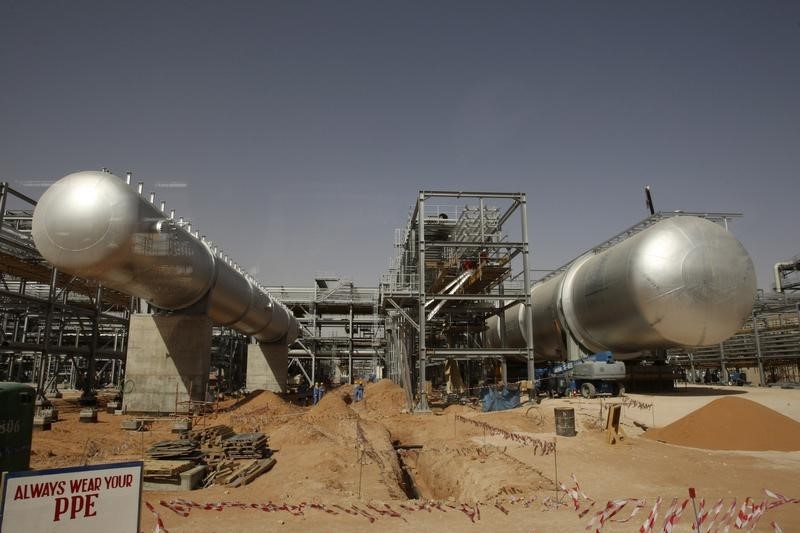(Bloomberg) -- The world’s largest oil producers are groping their way toward a deal to mitigate the devastating impact of the coronavirus crisis on their industry. The challenge now is to nail down numbers everyone can live with.
Ministers and diplomats will spend the next two days talking about who’s willing to cut production, and by how much. The most important contributions will come from oil’s trio of big powers: Saudi Arabia, Russia and the U.S.
An effective deal will require all three to participate, but not every barrel cut will be the same. Russia and Saudi Arabia are set to curb their production significantly, said people familiar with the negotiations. The U.S. is more likely to offer up the kind of gradual output reductions that will come as American companies respond to a market where prices are low and tanks are full.
After a turbulent few days in which U.S. President Donald Trump’s prediction of a historic output cut was followed by sniping between Moscow and Riyadh, there were signs that diplomats were making progress. U.S. Energy Secretary Dan Brouillette held a “productive discussion” over the phone on Monday with his Saudi counterpart Prince Abdulaziz bin Salman, the U.S. government said.
Trump Resists
The talks still face significant obstacles: a meeting of producers from OPEC+ and beyond -- which has been delayed once already -- is only tentatively scheduled for Thursday. Russia and Saudi Arabia want the U.S. to join in, but Trump has so far shown little willingness to do a deal with the cartel.
The Organization of Petroleum Exporting Countries and its allies will meet by video conference at 4 p.m. Vienna time on April 9, delegates to the group said. That will probably be followed the next day by talks between energy ministers from the Group of 20 on wider contributions to a production deal.
The G-20 may be a more acceptable forum to bring on board the U.S. and other big oil producers outside the OPEC+ alliance -- such as Canada and Brazil. Brouillette said he agreed with Prince Abdulaziz that there should be talks within that group “in the near future.”
Crude prices have fallen 50% this year, as the economic effects of the coronavirus pandemic have knocked out about a third of global demand. The price crash is so dramatic that it’s threatening the stability of oil-dependent nations, the existence of U.S. shale producers, and poses an extra challenge to central banks. Industry officials say that if a deal to cut supply in an orderly way isn’t reached, the market will simply force producers to slash output as storage space runs out.
The aim of talks, first revealed by Trump last week, is to cut oil production by about 10% -- the biggest ever coordinated reduction. Crude rallied on Trump’s comments but pared those gains as the diplomatic intricacies became clearer. Brent futures fell 3.5% on Monday, trading near $33 a barrel.
However, even if a deal is struck for as much as 10 million barrels per day, that will barely dent the supply glut, which is estimated at as much as 35 million barrels a day. In some corners of the physical market prices have already turned negative, and traders have been putting oil into tankers at a record pace to store it at sea.
Jump Together
Saudi Arabia and Russia both say they want the U.S., which has become the world’s largest producer thanks to its shale revolution, to join the cuts. But Trump had only hostile words for OPEC on Saturday, threatening tariffs on foreign oil, though at a briefing late Sunday he said he didn’t expect he’d have to use them.
It’s not clear if Russia and Saudi Arabia will require the U.S. to publicly commit to cut production -- a challenge in the private, fragmented American industry -- or if a compromise gesture would be enough. Alexander Dynkin, president of the Institute of World Economy and International Relations in Moscow, a state-run think tank, said Moscow would like the U.S. to lift some sanctions as a compromise.
Even a passive role for the American shale industry, whose output is already expected to go into decline at current prices, may be enough for a deal, according to Ed Morse, head of global commodities at Citigroup Inc (NYSE:C).
“I think there is already an understanding between Saudi Arabia, Russia and the U.S.,” Morse said. “The U.S. is a party to the agreement, in effect, because the price of oil is already reducing drilling activity to an extent that production will likely be down 1 million barrels a day by the end of the third quarter.”
Russia and Saudi Arabia -- which sparred publicly between themselves over the weekend -- have disagreed about how they would calculate the cuts, according to a person familiar with the talks.
Russia favors using an average of the first quarter output as the baseline, while Saudi Arabia wants to use its current April production. The difference is huge: the kingdom pumped 9.8 million barrels a day on average between January and March. In April -- as it wages its battle for market share -- it’s producing more than 12 million.
©2020 Bloomberg L.P.
